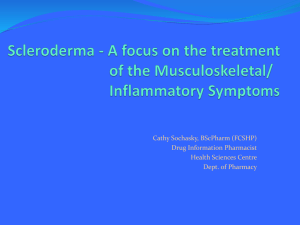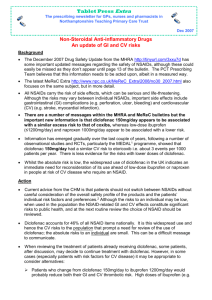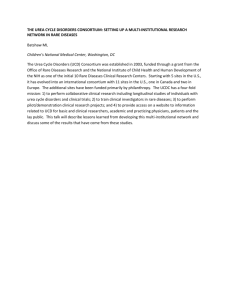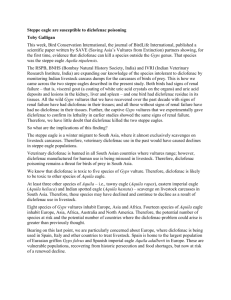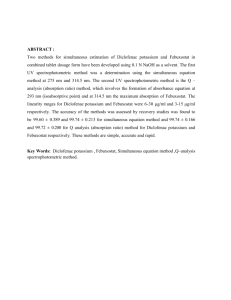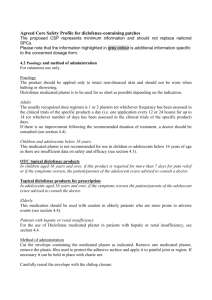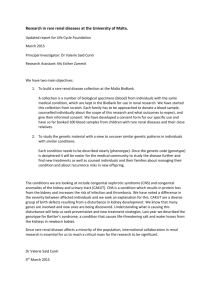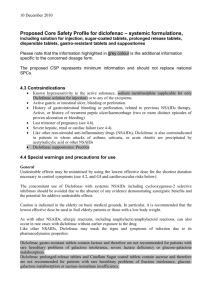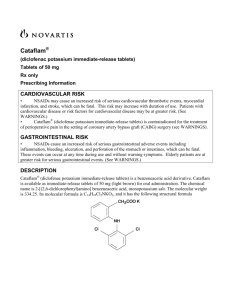החמרה לעלון לרופא
advertisement
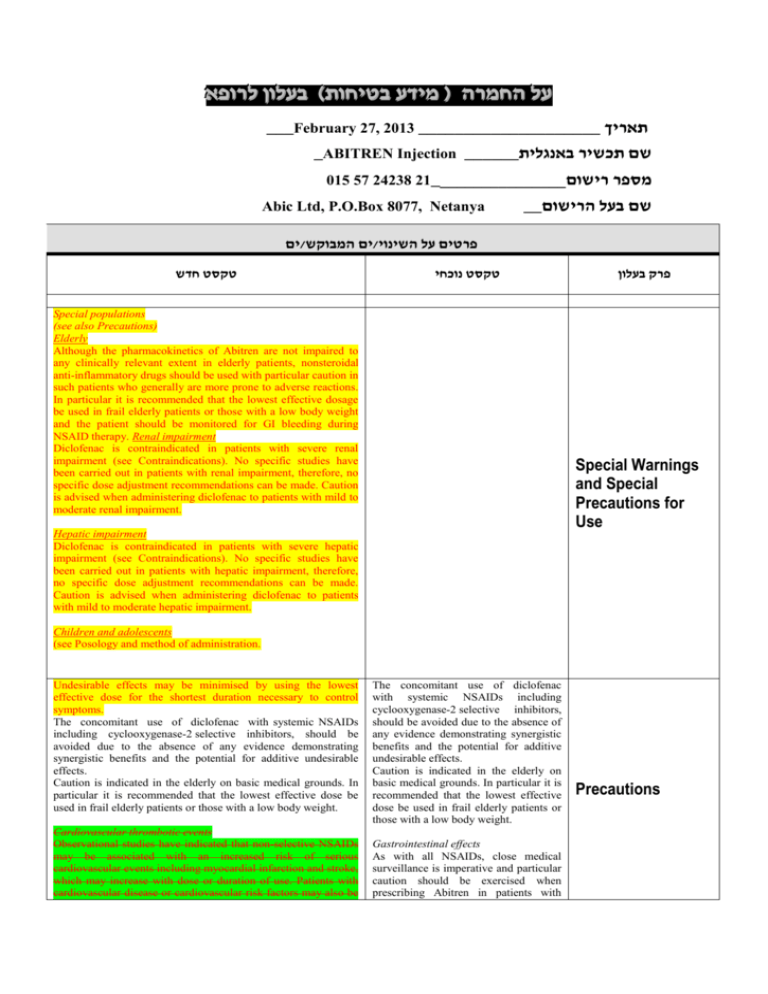
רופא בעלון ללרופא בטיחות) בעלון )מידע בטיחות החמרה (( מידע על החמרה על ___February 27, 2013 ____________________ תאריך _ABITREN Injection ______שם תכשיר באנגלית 015 57 24238 21________________מספר רישום Abic Ltd, P.O.Box 8077, Netanya __שם בעל הרישום ים/ים המבוקש/פרטים על השינוי טקסט חדש טקסט נוכחי Special populations (see also Precautions) Elderly Although the pharmacokinetics of Abitren are not impaired to any clinically relevant extent in elderly patients, nonsteroidal anti-inflammatory drugs should be used with particular caution in such patients who generally are more prone to adverse reactions. In particular it is recommended that the lowest effective dosage be used in frail elderly patients or those with a low body weight and the patient should be monitored for GI bleeding during NSAID therapy. Renal impairment Diclofenac is contraindicated in patients with severe renal impairment (see Contraindications). No specific studies have been carried out in patients with renal impairment, therefore, no specific dose adjustment recommendations can be made. Caution is advised when administering diclofenac to patients with mild to moderate renal impairment. פרק בעלון Special Warnings and Special Precautions for Use Hepatic impairment Diclofenac is contraindicated in patients with severe hepatic impairment (see Contraindications). No specific studies have been carried out in patients with hepatic impairment, therefore, no specific dose adjustment recommendations can be made. Caution is advised when administering diclofenac to patients with mild to moderate hepatic impairment. Children and adolescents (see Posology and method of administration. Undesirable effects may be minimised by using the lowest effective dose for the shortest duration necessary to control symptoms. The concomitant use of diclofenac with systemic NSAIDs including cyclooxygenase-2 selective inhibitors, should be avoided due to the absence of any evidence demonstrating synergistic benefits and the potential for additive undesirable effects. Caution is indicated in the elderly on basic medical grounds. In particular it is recommended that the lowest effective dose be used in frail elderly patients or those with a low body weight. Cardiovascular thrombotic events Observational studies have indicated that non-selective NSAIDs may be associated with an increased risk of serious cardiovascular events including myocardial infarction and stroke, which may increase with dose or duration of use. Patients with cardiovascular disease or cardiovascular risk factors may also be The concomitant use of diclofenac with systemic NSAIDs including cyclooxygenase-2 selective inhibitors, should be avoided due to the absence of any evidence demonstrating synergistic benefits and the potential for additive undesirable effects. Caution is indicated in the elderly on basic medical grounds. In particular it is recommended that the lowest effective dose be used in frail elderly patients or those with a low body weight. Gastrointestinal effects As with all NSAIDs, close medical surveillance is imperative and particular caution should be exercised when prescribing Abitren in patients with Precautions at greater risk. To minimise the potential risk of an adverse cardiovascular event in patients taking an NSAID, especially in those with cardiovascular risk factors, the lowest effective dose should be used for the shortest possible duration. Cardiovascular arterial thrombotic events (2) Clinical trial and epidemiological data consistently point towards an increased risk of arterial thrombotic events (for example myocardial infarction or stroke) associated with the use of diclofenac, particularly at high dose (150 mg daily) and in long-term treatment. Observational studies have indicated that nonselective NSAIDs may be associated with an increased risk of serious cardiovascular events including myocardial infarction and stroke, which may increase with dose or duration of use. Patients with cardiovascular disease or with significant risk factors for cardiovascular events cardiovascular risk factors (e.g. hypertension, hyperlipidaemia, diabetes mellitus, smoking) may also be at greater risk and should only be treated with diclofenac after careful consideration. To minimise the potential risk of an adverse cardiovascular event in patients taking an NSAID, especially in those with cardiovascular risk factors, the lowest effective dose should be used for the shortest possible duration. The patient's need for symptomatic relief and response to therapy should be reevaluated periodically. There is no consistent evidence that the concurrent use of aspirin mitigates the possible increased risk of serious cardiovascular thrombotic events associated with NSAID use. Hypertension NSAIDs may lead to the onset of new hypertension or worsening of pre-existing hypertension and patients taking antihypertensives with NSAIDs may have an impaired antihypertensive response. Caution is advised when prescribing NSAIDs to patients with hypertension. Blood pressure should be monitored closely during initiation of NSAID treatment and at regular intervals thereafter. Heart failure Fluid retention and oedema have been observed in some patients taking NSAIDs, therefore caution is advised in patients with fluid retention or heart failure. Gastrointestinal effects Gastrointestinal bleeding (haematemesis, melaena), ulceration or perforation which can be fatal has been reported with all NSAIDs including diclofenac and may occur at any time during treatment, with or without warning symptoms or a previous history of serious GI events. They generally have more serious consequences in the elderly. If gastrointestinal bleeding or ulceration occurs in patients receiving diclofenac, the drug symptoms indicative of gastrointestinal (GI) disorders or with a history suggestive of gastric or intestinal ulceration, bleeding or perforation, (see Undesirable effects). The risk of GI bleeding is higher with increasing NSAID doses and in patients with a history of ulcer, particularly if complicated with hemorrhage or perforation . Hematological effects During prolonged treatment with diclofenac, as with other NSAIDs, monitoring of the blood count is recommended. Like other NSAIDs, diclofenac may temporarily inhibit platelet aggregation. Patients with defects of hemostasis, should be carefully monitored. should be withdrawn . As with all NSAIDs, close medical surveillance is imperative and particular caution should be exercised when prescribing Abitren in patients with symptoms indicative of gastrointestinal (GI) disorders or with a history suggestive of gastric or intestinal ulceration, bleeding or perforation, (see Undesirable effects). The risk of GI bleeding is higher with increasing NSAID doses and in patients with a history of ulcer, particularly if complicated with hemorrhage or perforation and in the elderly. The elderly have increased frequency of adverse reactions to NSAIDs especially gastro intestinal bleeding and perforation which may be fatal (see Posology and method of administration). Hepatic Effects Close medical surveillance is required when prescribing diclofenac to patients with impairment of hepatic function as their condition may be exacerbated Hepatitis may occur with diclofenac without prodromal symptoms . Caution is called for when using diclofenac in patients with hepatic porphyria, since it may trigger an attack . Hematological effects During prolonged treatment with diclofenac, as with other NSAIDs, monitoring of the blood count is recommended. Like other NSAIDs, diclofenac may temporarily inhibit platelet aggregation. Patients with defects of hemostasis, bleeding diasthesis or hematological abnormalities should be carefully monitored. Severe skin reactions Serious skin reactions, some of them fatal, including exfoliative dermatitis, Stevens-Johnson syndrome (SJS) and toxic epidermal necrolysis (TEN), have been reported very rarely in association with the use of NSAIDs, including diclofenac. These serious adverse events are idiosyncratic and are independent of dose or duration of use. Patients appear to be at highest risk of these reactions early in the course of therapy, the onset of the reaction occurring in the majority of cases within the first month of treatment. Patients should be advised of the signs and symptoms of serious skin reactions and to consult their doctor at the first appearance of skin rash, mucosal lesions or any other sign of hypersensitivity, and Abitren should be discontinued. Systemic lupus erythematosus and mixed connective tissue disease In patients with systemic lupus erythematosus and mixed connective tissue disorders there may be an increased risk of aseptic meningitis. •Known hypersensitivity to the active substance, sodium metabisulfite or any of the other excipients. •Active gastric or intestinal ulcer, bleeding or perforation. • History of gastrointestinal bleeding or perforation, relating to previous NSAID therapy • Active, or history of recurrent peptic ulcer/haemorrhage (two or more distinct episodes of proven ulceration or bleeding) •Last trimester of pregnancy (see Pregnancy and lactation). •Severe hepatic renal and cardiac failure (see Special warnings and special precautions for use). •Like other non-steroidal anti-inflammatory drugs (NSAIDs), Abitren is also contraindicated in patients in whom attacks of asthma, angioedema , urticaria, or acute rhinitis are precipitated •Known hypersensitivity to the active substance, sodium metabisulfite or any of the other excipients. •Active gastric or intestinal ulcer, bleeding or perforation. •Last trimester of pregnancy (see Pregnancy and lactation). •Severe hepatic renal and cardiac failure (see Special warnings and special precautions for use). •Like other non-steroidal antiinflammatory drugs (NSAIDs), Abitren is also contraindicated in patients in Contraindications by ibuprofen , acetylsalicylic acid or other NSAIDs whom attacks of asthma, urticaria, or •Severe hepatic and renal and cardiac failure acute rhinitis are precipitated by , (see Special warnings and special precautions acetylsalicylic acid or other NSAIDs for use). Established congestive heart failure (NYHA class II-IV), ischaemic heart disease, peripheral arterial disease or cerebrovascular disease. Undesirable effects Adverse drug reactions from clinical trials and/or spontaneous or literature reports are listed by MedDRA system organ class. Within each system organ class, the adverse drug reactions are ranked by frequency, with the most frequent reactions first.Within each frequency grouping, adverse drug reactions are presented in order of decreasing seriousness. In addition, the corresponding frequency category for each adverse drug reaction is based on the following convention (CIOMS III): very common (>1/10); common (≥1/100, <1/10); uncommon (≥1/1,000, <1/100); rare (≥1/10,000, <1/1,000); very rare (<1/10,000; not known: cannot be estimated from available data The following adverse effects include those reported with diclofenac solution for injection and/or other pharmaceutical forms of diclofenac, with either short-term or long-term use. Adverse reactions are ranked under heading of frequency, the most frequent first, using the following convention: common (≥ 1/100, < 1/10); uncommon (≥ 1/1,000, < 1/100); rare (≥ 1/10,000, < 1/1,000); very rare (< 1/10,000), including isolated reports. The following undesirable effects include those reported with Abitren solution for injection and/or other pharmaceutical forms of diclofenac, with either short-term or long-term use. Nervous system disorders Common: Headache, dizziness. Rare: Somnolence, tiredness . Very rare: Paresthesia, memory impairment, convulsion, anxiety, tremor, aseptic meningitis, taste disturbances (dysgeusea), cerebrovascular accident. Unknown: confusion, hallucinations, disturnances of sensation, malaise Eye disorders Very rare: Visual disturbances, vision blurred, diplopia. Unknown: optic neuritis Hepatobiliary disorders Common: Transaminases increased. Rare: Hepatitis, jaundice, liver disorder. Very rare: Fulminant hepatitis, hepatic necrosis, hepatic failure . Skin and subcutaneous tissue disorders Common: Rash. Rare: Urticaria. Very rare: Bullous eruptions (dermatitis, eczema, erythema, erythema multiforme, Stevens-Johnson syndrome, toxic epidermal necrolysis (Lyell's syndrome), dermatitis exfoliative, loss of hair, photosensitivity reaction, Henoch-Schonlein Undesirable effects Adverse reactions are ranked under heading of frequency, the most frequent first, using the following convention: common (≥ 1/100, < 1/10); uncommon (≥ 1/1,000, < 1/100); rare (≥ 1/10,000, < 1/1,000); very rare (< 1/10,000), including isolated reports. The following undesirable effects include those reported with Abitren solution for injection and/or other pharmaceutical forms of diclofenac, with either short-term or long-term use. Nervous system disorders Common: Headache, dizziness. Rare: Somnolence. Very rare: Paresthesia, memory impairment, convulsion, anxiety, tremor, aseptic meningitis, taste disturbances , cerebrovascular accident. Eye disorders Very rare: Visual disturbances, vision blurred, diplopia. Hepatobiliary disorders Common: Transaminases increased. Rare: Hepatitis, jaundice, liver disorder. Very rare: Fulminant hepatitis Skin and subcutaneous tissue disorders Common: Rash. Rare: Urticaria. Very rare: Bullous eruptions (dermatitis, eczema, erythema, erythema multiforme, Stevens-Johnson syndrome, toxic epidermal necrolysis (Lyell's syndrome), dermatitis exfoliative, loss of hair, photosensitivity reaction, purpura, allergic purpura, pruritus. Renal and urinary disorders Very rare: Acute renal failure, haematuria, proteinuria, nephrotic syndrome, interstitial nephritis, renal papillary necrosis. General disorders and administration site conditions Common: Injection site reaction, Adverse events purpura, allergic purpura, pruritus. Renal and urinary disorders Very rare: Acute renal failure, haematuria, proteinuria, nephrotic syndrome, tubulointerstitial nephritis, renal papillary necrosis. injection site pain, injection site induration Rare: Edema, injection site necrosis. General disorders and administration site conditions Common: Injection site reaction, injection site pain, injection site induration Rare: Edema, injection site necrosis. Reproductive system and breast disorders Very rare: impotence. Potent CYP2C9 inhibitors Caution is recommended when co-prescribing diclofenac with potent CYP2C9 inhibitors (such as sulfinpyrazone and voriconazole), which could result in a significant increase in peak plasma concentrations and exposure to diclofenac due to inhibition of diclofenac metabolism. Other NSAIDs including cyclooxygenase-2 selective inhibitors and corticosteroids: Concomitant administration of diclofenac and other systemic NSAIDs or corticosteroids may increase the frequency of gastrointestinal undesirable effects Avoid concomitant use of 2 or more NSAIDs (see Special warnings and special Drugs known to cause hyperkalemia) Concomitant treatment with potassium-sparing diuretics, ciclosporin, tacrolimus or trimethoprim may be associated with increased serum potassium levels, which should therefore be monitored frequently. Phenytoin When using phenytoin concomitantly with diclofenac, monitoring of phenytoin plasma concentrations is recommended due to an expected increase in exposure to phenytoin. Tacrolimus) Possible increased risk of nephrotoxicity when NSAIDs are given with tacrolimus. This might be mediated through renal antiprostagladin effects of both NSAID and calcineurin inhibitor. Phenytoin When using phenytoin concomitantly with diclofenac, monitoring of phenytoin plasma concentrations is recommended due to an expected increase in exposure to phenytoin. Colestipol and cholestyramine These agents can induce a delay or decrease in absorption of diclofenac. Therefore, it is recommended to administer diclofenac at least one hour before or 4 to 6 hours after administration of colestipol/ cholestyramine. Mifepristone NSAIDs should not be used for 8-12 days after mifepristone administration as NSAIDs can reduce the effect of mifepristone. Other NSAIDs and corticosteroids: Concomitant administration of diclofenac and other systemic NSAIDs or corticosteroids may increase the frequency of gastrointestinal undesirable effects(see Special warnings and special Drug Interactions Others
